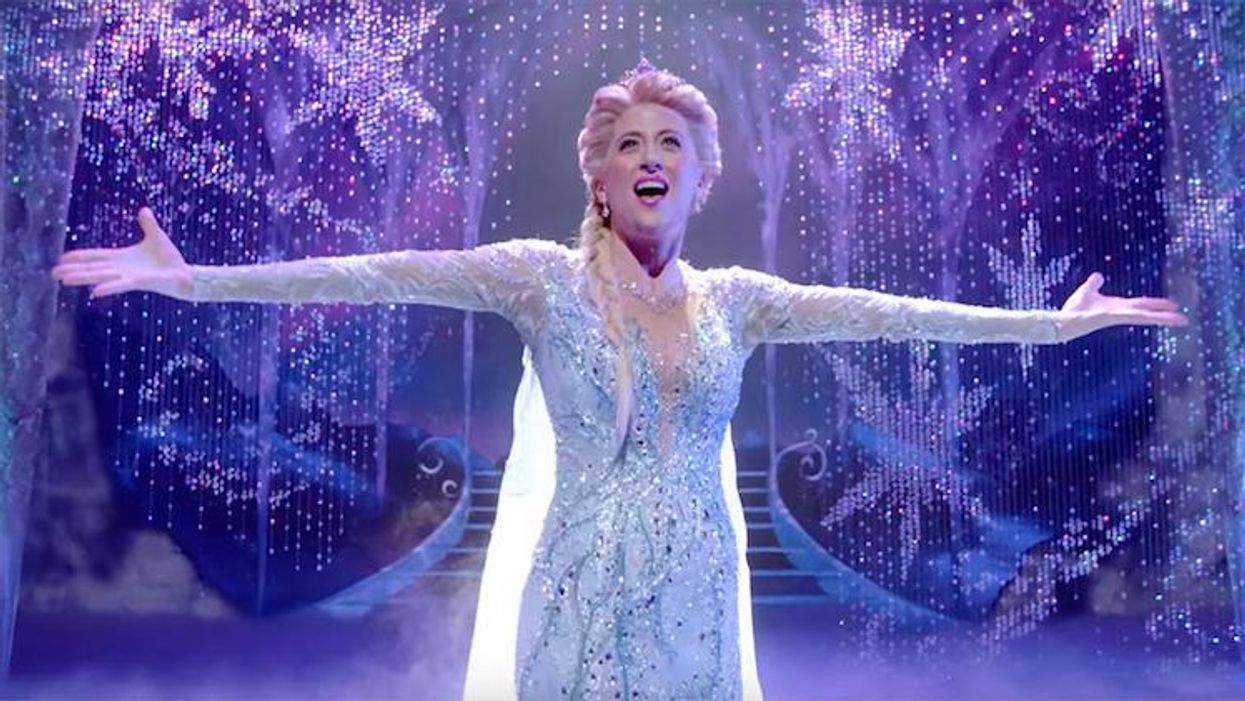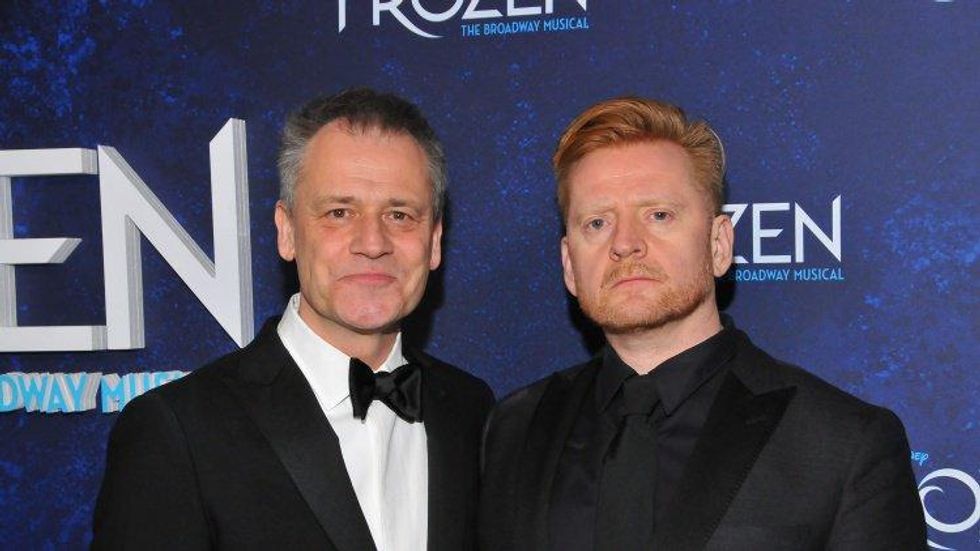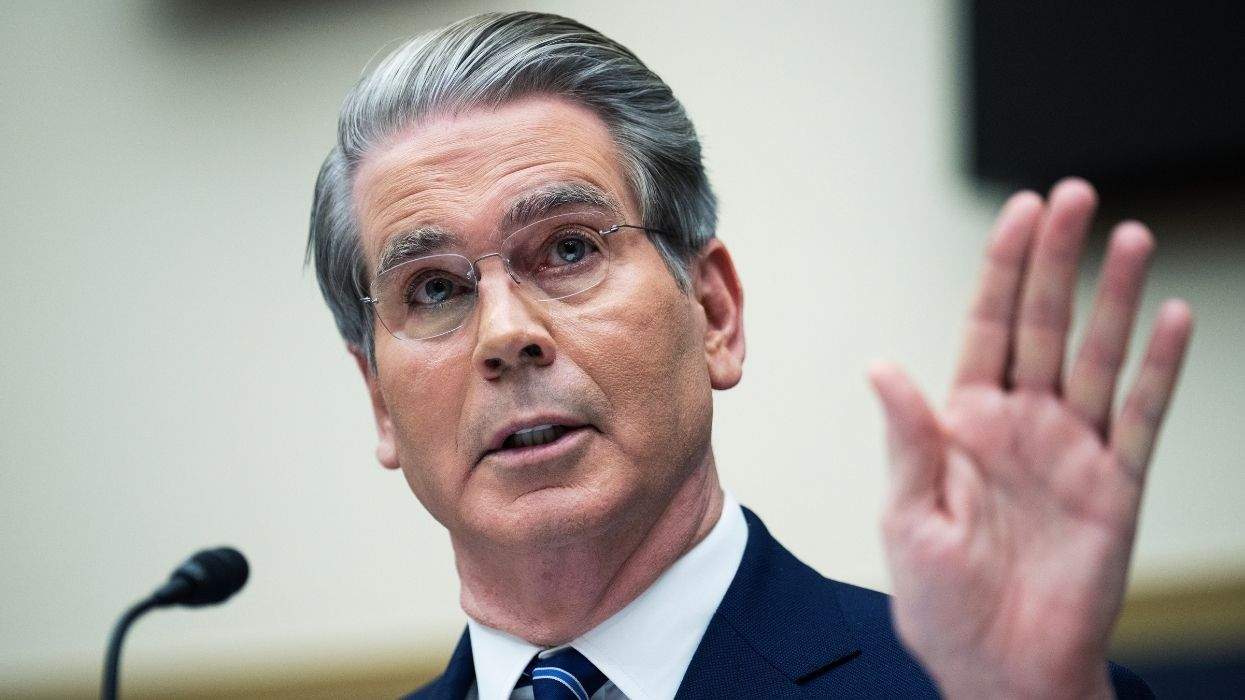Prolific theatrical team Michael Grandage and Christopher Oram aren't just partners when it comes to the stage -- they're also partners, and that relationship colors every production the pair have worked on, including Frozen, the Broadway adaptation of Disney's genre-smashing animated musical. Whether it comes to bringing a Norweigan fjord to life onstage or turning the now-legendary "Let It Go" into a magical first-act closer through a combination of technical wizardry and powerful storytelling, this duo knew that they couldn't simply "dump Frozen onstage," they had to create a piece of theater that would stand on its own.
After seeing Frozen on Broadway, we spoke with director Michael Grandage and scenic/costume designer Christopher Oram about how "the work" serves as the foundation of their relationship and the unique process of turning an animated musical into a Broadway spectacular.
OUT: What are the challenges of bringing a beloved Disney film that is so saturated in the popular consciousness to life onstage -- in particular, a film like Frozen where the central conceit is magical?
Michael Grandage: The biggest challenge is making sure that you honor the film for people who are coming to see some version of it while being true to yourself in wanting to make something for a new medium and being excited by that. It wasn't interesting to any member of the creative team to take the film and dump it onstage, that was of no excitement to any of us -- nor was it what Disney asked for, they wanted to create version of Frozen for the stage, something that honors the quite forward-thinking nature of the movie, something that honors the magic that's available in the film but turns it into stage magic. The simple challenge was to make sure we honored the material but took it in a new direction.
While the musical is an extension of the film, does it stand on its own as its own work?
MG: That was certainly the intention. I hope that the stage version can lead us into the next Frozen movie and take us away from the last movie and operate independently of both but be connected to both.
Obviously the most iconic moment of the film and one of the most powerful moments in the musical is "Let It Go." How did you bring that to life onstage knowing that the audience is waiting for that moment?
Christopher Oram: It's daunting, of course it's daunting, but putting anything in front of an audience is always daunting, whether you're doing a Shakespeare plays that's been done 100 times before or you're doing a piece like this that's never been done onstage before. I approached it with a degree of respect and a degree of trepidation. And also the excitement of doing it, rising to the challenge -- and the thing about that moment is that it's absolutely a narrative crux point, and the narrative drives you to it, Elsa's journey drives you to it, the music drives you to it, and you want to deliver a moment of extreme stage craftsmanship. It's a lot due to the tailoring of both garments -- there's lots of technical stuff in that dress that I'm not allowed to talk about, with the Disney of it all. The bottom line is that it takes a combination of brilliant dressmaking, a brilliant performance from Caissie Levy (Elsa) and a lot of people behind the scenes. A lot of people come together to make that one moment work.
Frozen subverts the classic Disney tropes: at its core obviously it's a story about love and family and identity, but it's also very much a story about female agency.
MG: When we saw the movie we could see from the credits the female writers and director, and now we know these women and their daughters, interestingly enough, and both Kristen [Anderson-Lopez, co-writer of Frozen's music] and Jennifer Lee [the writer and director of Frozen] are very focused women wanting to tell women stories from a woman's perspective and they're bringing up daughters in the world and that's a huge responsibility that's inherent in their storytelling in the mediums that they're working in. To inherit that as part of our brief time working alongside them, it becomes very apparent very quickly how you want to do that justice, it's an exciting and powerful moment to be able to put their stories onstage, and that's been one of the privileges for us. Whatever else we are, you're talking to two interpretive artists -- our job is to interpretive the work of the creative artists -- the writers -- and we interpret them with huge creative freedom. But they came to us with a very strong story to tell.
Michael Grandage and Christopher Oram. (Photography by Steve Shevett)
I saw Frozen after two nights of seeing both parts of Harry Potter and the Cursed Child, so this idea of theater as spectacle was very much in my mind going into Frozen, which obviously also utilizes special effects to create magic onstage. In a world where audiences are becoming increasingly used to mind-blowing CGI and special effects in film and TV, is there pressure to bring that to the theater as well?
MG: I hope not, because one of the joys of what we have done for hundreds of years in the theater is do all sorts of magic with very very little. Magic usually is just the imagination of the people watching, we invite their imagination to go on flights of fancy, and we've done it in the most basic way for centuries. Every so often the theater demands more, and spectacle is a great word, because what's required on Broadway -- particularly in musicals, although Harry Potter is a play -- the spectacle is part of what the public is paying for, so we have to rise to it. There's part of me that says bring it on, but I have been moved beyond all measure in the theater with very very little, just the power of simple storytelling, a great actor, a great text and very little on the stage, and its moved me as much as anything I've seen in our own production or indeed in Harry Potter or anything else.
To your point, I hope that doesn't have to change because of what CGI is doing, what television is doing, what the film has always done in a way. The other thing we have that film and television never have is the opportunity to abstract everything -- you can't abstract onscreen but you can in the theater. A young woman can walk to the front of the stage and sort of say, without even saying it, "tonight I will be a very old woman, or tonight I will be a man," or "tonight I will be a wizard," and we don't ever go, well wait a minute but you aren't. We're in the theater so we can. Magic is a wonderful thing, and effects are wonderful and budgets are wonderful when you get given them and get to make use of them, but I also hope that we don't lose the simplicity of the theater.
Related | Harry Potter and the Cursed Child is Theatrical Fanfiction at Its Most Magical
As partners both onstage and off, what is your working dynamic like and what are the gifts of working together and what are the challenges?
MG: I'm not sure we'd be together if we didn't have the work. The work is what has brought us together in the first place and what has kept us together over 23 years. It's the thing that defines us and it's our common denominator. That's not to say that the moment you take the work out the relationship falls to pieces, we find other things to keep us going and increasingly as we've got older we can step away from the work, but I always find it really difficult to talk about it. We met through work and we're still here -- talking to you -- through work because of Frozen. We share the same taste, our aesthetic is what binds us.
Christopher: Michael and I have very little in common, day to day, but we have a similar taste in things, that's what interesting. It's as simple as he likes red wine, I like white wine -- but we both like wine. There's a truism that balances it all out -- I know how to design for him, he knows how to direct in my spaces.
Frozen has been latched onto by queer people who see in it one of the first queer Disney narratives -- partly because it is a story about female agency and the lack of a male love interest for Elsa. Jennifer Lee has said that there is a possibility Elsa could have a female love interest in Frozen 2. Do you consider Frozen a queer story?
MG: For us, there's something that's attracting us to the story besides the story itself, something that appeals to us together. In every story I've got to find some narrative like that, otherwise I don't know why I'm telling the story anyway. Frozen, because of the nature of the story, I don't have to think too deep in order to excavate all that. None of the response has been a surprise, because everyone looks at this story and finds something that speaks to them, and Elsa most particularly -- her individual plight, really is something that appeals to those people that are seeking some kind of identity for themselves, because she is trying to work out who she is and how she can be free. In that respect, the story has colossal appeal across all communities. You'd like that in every piece of work you do and I guess Frozen has a huge head start because the writers originally wanted to tell the story of both the women and most particularly Elsa.
Related | Frozen 2 Director Hasn't Ruled Out a Female Love Interest for Elsa
Are you sick of "Let It Go" yet?
CO: No.
MG: No. We should be, shouldn't we, but we're not. I think I might have been, but the thing that's stopping me now is that we've created a piece where "Let It Go" is the center, and the song has become a new song in the context of the show. It's the Act I closer, an anthem to individuality and it's the Act II closer as an anthem to understanding each other. "Here I stand" becomes "here we stand," and the absolute crucial importance of the show is, to be able to stand alone we have to be able to stand together, and that one lyric change, reprising that song as a choral number at the end, allows that song to renew.
Frozen the Broadway Musical is now open at St. James Theatre in New York City. Get tickets at the official website.






























